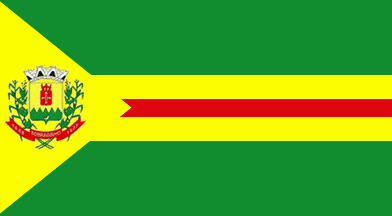 image by Dirk Schönberger,
19 April 2012
image by Dirk Schönberger,
19 April 2012Source: http://www.sobradinho-rs.com.br/site/?pg=simbolos

Last modified: 2020-08-08 by ian macdonald
Keywords: rio grande do sul | sobradinho |
Links: FOTW homepage |
search |
disclaimer and copyright |
write us |
mirrors
 image by Dirk Schönberger,
19 April 2012
image by Dirk Schönberger,
19 April 2012
Source:
http://www.sobradinho-rs.com.br/site/?pg=simbolos
The municipality of Sobradinho (14,162 inhabitants in 2007; 13,039 ha) is
located 250 km of Porto Alegre.
Sobradinho was settled in 1839 by Joaquim
Vicente de Toled, who erected a wooden "sobradinho" on the road linking Rio
Pardo to Soledade. Used as a landmark by travelers, the building was burned down
in 1840 during the Ragamuffin War, the Toledo family being loyal to the Empire.
In 1848, the family of Bento Antonio Pereira, from São Paulo, established near
stream Bugra a small "carijo" (workshop) to produce mate; accordingly, the
stream was renamed to Carijinho. The first plots were sold in 1898 to German and
Italian immigrants; the Sobradinho colony was officially established in 1901.
Frederico Mundstock inaugurated on 1908 an hotel that was operated until 1958.
The land surveyor Alfredo Neri, commissioned by the Land Commission, designed
the town's streets in 1924, while the road connecting Sobradinho to Cachoeira do
Sul was built in 1926.
http://sobradinho.rs.gov.br/
Municipal website
Ivan Sache, 6 August 2020
Horizontally banded green-yellow-red-yellow-green, 3-1-1-1-3, with a yellow
triangle extending from the hoist bearing the municipal coat of arms.
Dirk Schönberger, 19 April 2012
The municipality of Jacuí was established by a State Decree promulgated on 3
December 1927, separating from Soledade. The municipality was renamed to
Sobradinho by Decree No. 20 issued on 25 October 1937.
The flag of
Sobradinho was designed by Arcinoé Antônio Peixoto de Farias.
1 - The coat of
arms applied on the flag represents the municipal government.
2 - The yellow
isosceles triangle charged with the coat of arms represents the town of
Sobradinho proper, as the municipality's seat. The triangle is a symbol of
Liberty, Equality and Fraternity; yellow is a symbol of glory, splendor,
greatness, wealth and sovereignty.
3 - The central yellow stripe charged with
another, red stripe, represents the spread of the municipal power all over the
municipal territory. Red is a symbol of dedication, self-esteem, audacity,
courage and valiance.
4 - The green quarters represent the rural estates
scattered over the municipal territory. Green is a symbol of honor, civility,
citizenship, courtesy, glee and abundance; green also symbolizes hope as
greening fields in spring promising profuse harvests.
The coat of arms of
Sobradinho was designed by Arcinoé Antônio Peixoto de Farias.
1 - At the
shield's left and right are represented the main crops at its time of
re-establishment: tobacco, introduced in the municipality by German immigrants,
and maize, mostly grown by Italian immigrants.
2 - In the center, the
escutcheon reproduces the arms of the Bento Pereira family, referring to Bento
Antonio Pereira, who initiated the settlement of Sobradinho with his family in
1848.
3 - Beneath the shield a wavy green field representing the hilly
topography and the agricultural fields, a silver hunting horn, in cow-boy style,
representing cattle breeding.
4 - The yellow background symbolizes glory,
splendor, greatness, wealth and sovereignty.
5 - The red scroll in the lower
part, with the municipality's name, is inscribed with the years "1848" and
"1927".
6 - The mural crown surmounting the shield is the universal symbols
of domains, classifying a town of 3rd rank, or municipality seat.
http://www.sobradinho.rs.gov.br/site/index.php/en/municipio1/simbolos
Municipal website
Photos
https://www.facebook.com/prefeiturasobradinhors/photos/a.216479521809594/307626179361594/?type=3&theater
https://www.facebook.com/prefeiturasobradinhors/photos/a.216479521809594/300643260059886/?type=3&theater
Ivan Sache, 6 August 2020